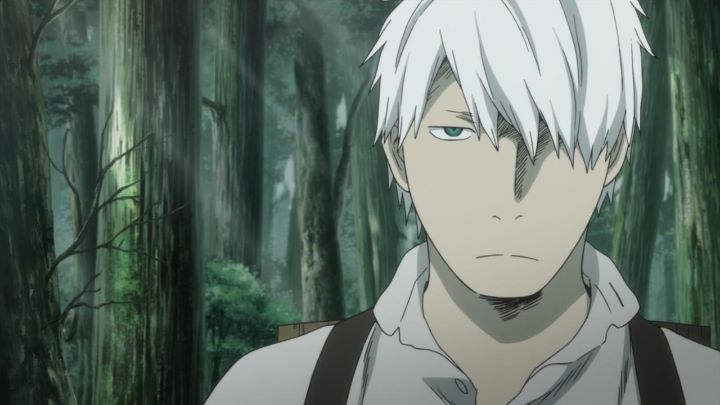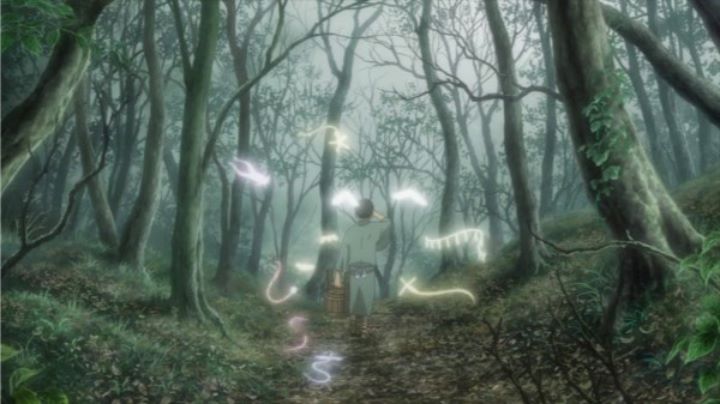










I do not know that I have ever seen an anime series as close to perfection as 2005's 24-episode show "Mushi-Shi." It isn't particularly exciting, groundbreaking or daring. It is best described as a set of standalone stories, each one or two episodes long, the entirety feeling like an anthology of ghost stories. Not quite as horrific as ghost stories, but perhaps more often like folk tales. The characters in each story sometimes get left with a happy ending, a sad ending, or simply in awe of the experience that occurred. For the viewer, it is meditative, like storytelling for the soul.The stories all revolve around "Mushi." Mushi are a Japanese term for small, often invisible monsters that exist in our daily lives. They can often be the cause of many things, like catching a cold or missing household items. Or sometimes, the cause for the people of entire towns turning into sand. In rural Edo Japan, there exist travellers called "Mushi-Masters" (or "Mushi-Shi"), who are knowledgable about Mushi and can help resolve the problems they cause. Ginko is one such master, a monk with white hair covering one eye, wearing a simple shirt and pants, a large backpack and perhaps some cigarettes. He is the single thread that ties each episode, as often he is tasked with resolving a new issue in a new town in each episode related to Mushi. While one or two episodes will offer some insight to Ginko, he is really just a secondary character, the victim of a Mushi typically being the focus of each story.This may sound repetitive. And if the idea of watching dozens of episodes each revolving around a baffled wooden-sandled Japanese farmer in a grassy forest doesn't sound entertaining, then you may not enjoy "Mushi-Shi." Despite my initial concerns, I was amazed at how each episode felt fresh and interesting. Not enough perhaps to marathon in a single weekend, but easily entertaining enough to watch an episode every day indefinitely for the rest of my life. I credit this to the show's pacing and atmosphere. There's always a sense of mystery and magic in each story, and often great character studies when a Mushi has a profound effect on a person's life. It's all the more watchable that each story is standalone, so you could easily skip episodes or watch them out of order. I cannot deny that this is the best example of storytelling I have ever seen, from the first episode to the last.The production is also consistent and timeless: the show takes place mostly in detailed forests, fields, mountains and caves. The characters have thick outlines that make them feel like traditional Japanese paintings, but the style isn't too strong to be distracting. The biggest treat is the Mushi themselves, which are surprisingly varied in design, and are great to watch when in movement. The only reason I would have to knock points off here is that many of the episodes tend to look the same after a while, since the setting is always rural Japan. The music is simple but hits the right tone, and has a great opening theme and unique ending songs for most of the episodes. The English dub by Funimation is well-tuned to the show's tone, especially with Ginko, giving him a wise presence despite also being sometimes abruptly straghtforward.  "Mushi-Shi"'s first season had 26 episodes, which is plenty of content to enjoy, but it could easily have gone on for many more episodes before I would get bored. By some miracle, the show did receive a second season and feature-selngth specials in 2014, nearly a decade after the original anime, and it maintained the same timeless artstyle and storytelling as if there was no production gap at all. Critics almost unanimously praise the franchise as a masterpiece, the type of shared praise I never hear about anything else. However, Funimation's release of the first season moved pretty quickly to its affordable S.A.V.E. line, suggesting it didn't make much money for the company. Aniplex USA would distribute online streaming of the second season, whether it was because Funimation didn't want to bid or because Aniplex didn't let them bid, we would never know. And again, despite overwhelming praise, the show was never really talked about, either than saying "yeah, it's perfect," before moving online discussions to other shows that could garner more varied discussion. This passe treatment likely led to the second season never being released on home video in the USA (as of 2018), the only English-subtitled option in the world being on Austrailian DVD's of a different region code. It's a shame, because this is probably the only show I would gladly spend thousands of dollars for, even if I am the only one to think so. Perfect for a sleepy Sunday afternoon with a cup of tea, if I had to pick only one anime series to spend the rest of my life with, it would be "Mushi-Shi."
"Mushi-Shi"'s first season had 26 episodes, which is plenty of content to enjoy, but it could easily have gone on for many more episodes before I would get bored. By some miracle, the show did receive a second season and feature-selngth specials in 2014, nearly a decade after the original anime, and it maintained the same timeless artstyle and storytelling as if there was no production gap at all. Critics almost unanimously praise the franchise as a masterpiece, the type of shared praise I never hear about anything else. However, Funimation's release of the first season moved pretty quickly to its affordable S.A.V.E. line, suggesting it didn't make much money for the company. Aniplex USA would distribute online streaming of the second season, whether it was because Funimation didn't want to bid or because Aniplex didn't let them bid, we would never know. And again, despite overwhelming praise, the show was never really talked about, either than saying "yeah, it's perfect," before moving online discussions to other shows that could garner more varied discussion. This passe treatment likely led to the second season never being released on home video in the USA (as of 2018), the only English-subtitled option in the world being on Austrailian DVD's of a different region code. It's a shame, because this is probably the only show I would gladly spend thousands of dollars for, even if I am the only one to think so. Perfect for a sleepy Sunday afternoon with a cup of tea, if I had to pick only one anime series to spend the rest of my life with, it would be "Mushi-Shi."